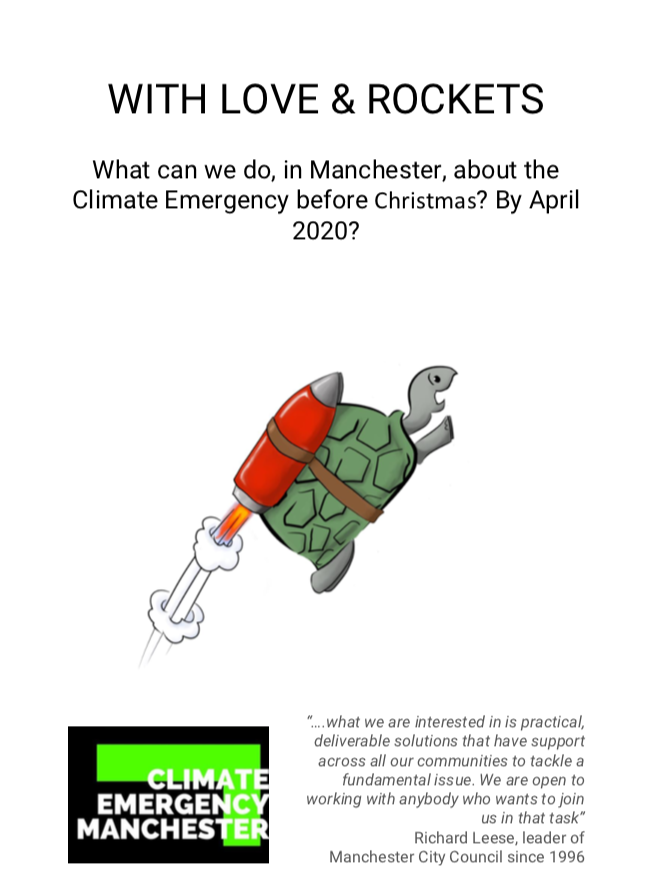26th October 2019
On Tuesday 22nd, Manchester City Council held the first Scrutiny Climate Change Subgroup since it declared Climate Emergency. This will show how Manchester responds to the climate emergency.
Institutions, business and the general public are very aware of the Climate Crisis. Or the should be. Many Authorities and institutions have declared Climate Emergency. The companies try new methods for being environmentally friendly, ans citizens spend days on protests asking for a bolder action to tackle the problem.
After the step of declaring the climate emergency unanimously, the council released 23 proposals. Most of them have not started yet or are just refurbished from old plans.
Climate Emergency Manchester released a report which highlights some of its in-action. Among many others, they mention that the council has not hired new staff for this purpose, either they have received an appropriate carbon literacy. The council has not submitted any meaningful bid about its action. And the transparency is quite behind standards.
‘It is complex’ were the most repeated words
Councillor Angeliki Stogia, Executive Member for Environment said: «Realistically, we can not achive our intentions overnight. But we are balancing this against the need to reduce carbon emissions as much as possible as soon as possible».
She states that Manchester City Council has reduced its carbon emissions by almost 50 per cent since 2010. However, it is worth noting that the council has cut staff and sold off some buildings, too.
«Tackling climate change isn’t something we can do on our own, it’s a responsibility for everyone in the city. We are determined to show real leadership. This means putting the push for zero carbon at the heart of everything we do».
Annette Wright, Labour, was who proposed the Climate Emergency. She said: ‘I am pleased that the council is demonstrating that we understand the seriousness and urgency (of that issue)».
Councillor Richard Killpatrick for Didsbury West was the most inquisitive during the committee: «I think the council could and should be doing much more. But we also need the resource from the central government, I accept that, but the reaction thus far leaves a lot to be desired».
Although he seems positive about the willings, he also thinks it is possible to do more, especially from business around Manchester.
«I think people are on board – they understand».
«Businesses is taking longer – but people drive demand and I am sure that people will come to expect this be a priority for the private sector. I just worry how long that will take».
Grassroots proposals

Climate Emergency Manchester has submitted some proposals. Firstly they request transparency from MCC actuation. Secondly, they ask for an organisational change. Thirdly, CEM proposes to shift into plant-based food canteens of council organisation. Finally, they ask the council engages with a low carbon transport. This included proposals about the Bee Network for bikes and pedestrians, to change the bus fleet and include the Airport on the carbon budget.
Marc Hudson, one of the five core group members of CEM, is sceptical about what the council has done so far and what it will do in the future: «There is a lot of fine words from members about doing things better. But we have seen very little action from senior members, who are in leadership positions, either formally or informally».
«There is just an enormous lack of political will, a lack of understanding that you can not declare Climate Emergency and then continue with business as usual, as this council has essentially done».
Other people submitted some exciting actions. They ask to include the environment on the schools portfolios, fix free car days, identify areas suitable for renewable energy in the local plan, and develop a pilot project to retrofit existing properties, among others.
The truth is that MCC only is responsible for 2% of the carbon footprint. They must rule how the city face the climate emergency, though. There are other authorities level involved in handle the climate emergency; needless say it is a global problem not only in the UK. It needs a collective effort. Although MCC is pushing in the right direction, maybe we should to push a bit harder and then, maybe, Manchester responds to the climate emergency

